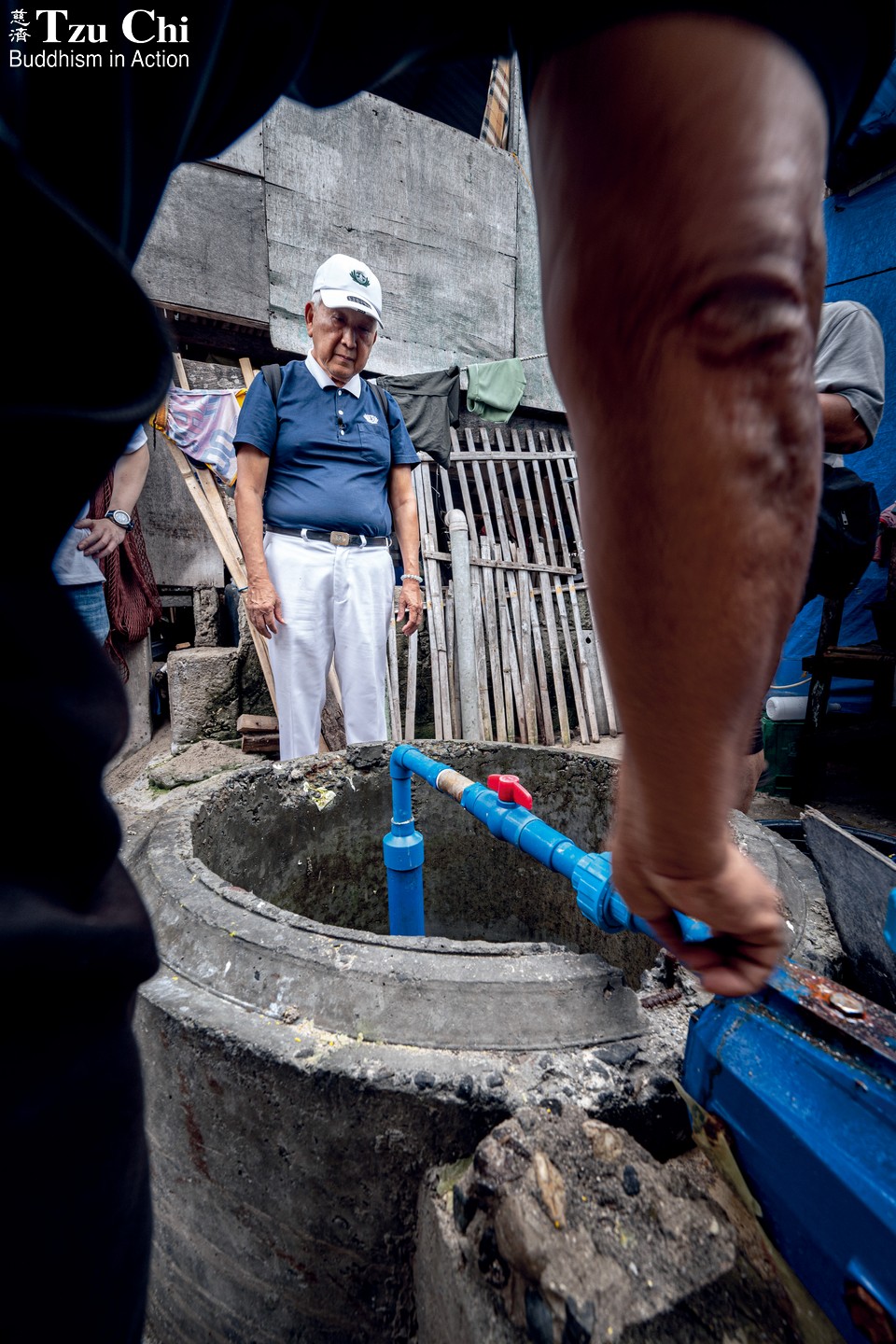By Jiang Ji-fang
Translated by Wu Hsiao-ting
Photos by Hsiao Yiu-hwa
Marking a decade of service, Tzu Chi volunteers in Bohol, the Philippines, continue to drive meaningful change through education, disaster relief, and community support.
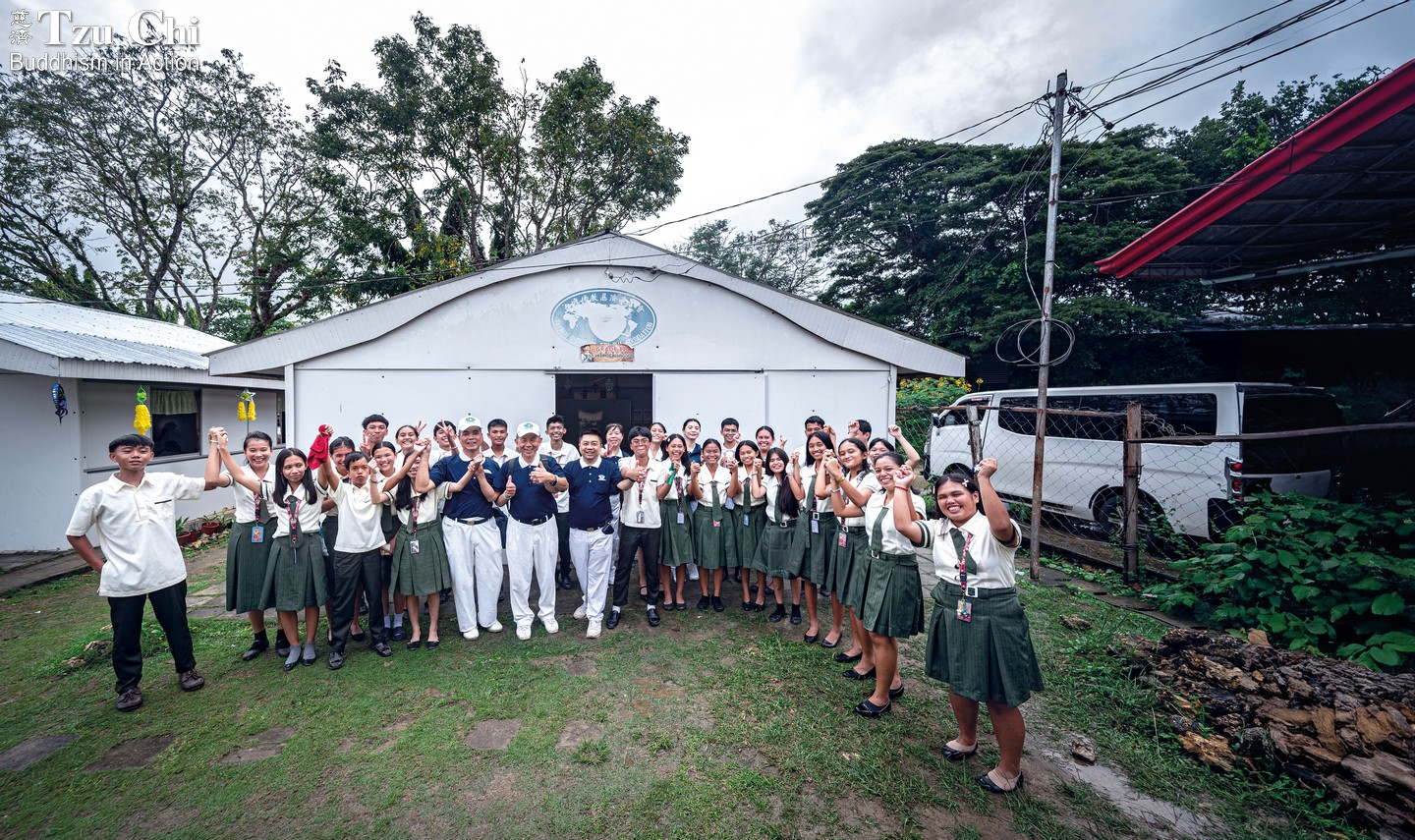
In 2014, volunteers from Taiwan helped build temporary classrooms at Infant King Academy. A decade later, they revisited the site and joyfully posed with students at the school.
Bohol, an island province in the Philippines, is a popular tourist destination and diving paradise, known for its enigmatic Chocolate Hills and the rare, protected tarsiers. Beyond these iconic attractions, the people of Bohol are down-to-earth, hospitable, and deeply rooted in religious faith. Their warmth transcends language—a friendly smile can bridge the gap.
In December 2024, our team from Da Ai TV in Taiwan visited this beautiful island to document a decade of dedication by Tzu Chi volunteers. Over the years, these volunteers have done their best to make a difference in the region, particularly in the field of education.
The Philippines has many universities, but many children from impoverished families struggle to complete even secondary education. According to the Philippine Department of Education’s 2018 statistics, the dropout rate among secondary school students was 11 percent. For those that did graduate, less than half pursued higher education. As of 2023, over 15 percent of the Philippines’ 117 million population lived below the poverty line. This means approximately 17.54 million people or three million families. With an average monthly income of only 12,000 pesos (US$205) per five-person household, many families can barely meet their basic needs, let alone afford education. As a result, the dream of higher education remains out of reach for many children.
Tzu Chi’s support for Bohol has extended beyond charity and medical referrals to include education. By helping local students pursue their education, Tzu Chi has given them a chance to escape poverty and build a brighter future.
After a major earthquake
On October 15, 2013, a magnitude 7.2 earthquake struck Bohol, leaving more than 200 people dead or missing and damaging tens of thousands of structures. Volunteers from Manila, approximately an hour and a half away by plane, traveled to Bohol to assess damage and provide aid. However, just three weeks later, Typhoon Haiyan devastated nearby regions, including Leyte, leaving catastrophic destruction in its wake. In response, many NGOs, including Tzu Chi, redirected their resources to the urgent relief efforts in the typhoon-affected regions, temporarily halting aid operations in Bohol.
Over a month later, James Chua (蔡青山), a Tzu Chi volunteer who had assessed damage in Bohol, visited the Jing Si Abode in Hualien, Taiwan, to report on the relief efforts for Typhoon Haiyan. During his visit, Master Cheng Yen gently reminded him, “Don’t forget Bohol.” Taking her words to heart, Chua and other volunteers returned to Bohol in early 2014. During their trip there, local officials appealed to them, pleading, “Please visit our schools. Our students haven’t been able to attend classes properly for months!”
Vergie P. Almosura was a high school senior when the earthquake struck, leaving her school’s classrooms in ruins. She and her schoolmates were forced to attend lessons in makeshift tents, enduring stifling heat on sunny days and navigating puddles from leaks during rainy ones. When she was about to graduate, Tzu Chi volunteers visited the school, assessed the situation, and decided to construct temporary classrooms to create a more conducive learning environment.
In early June, construction materials were delivered, and a volunteer team arrived from Taiwan. They worked alongside parents, teachers, and local residents, teaching them how to assemble the structures. In total, 150 classrooms were built for 19 schools across nine towns in Bohol.
Vergie joined local residents in making concrete flooring bricks for the classroom construction project. She had already graduated by the time the classrooms were completed, but she was nonetheless overjoyed to see her younger schoolmates finally learning in a much-improved environment.
In October 2013, a powerful earthquake struck Bohol, severely damaging many school buildings. Sandingan National High School resumed classes under canopies set up beneath trees. Lin Yan-huang
By July 2014, the newly constructed temporary classrooms at Carmel Academy were completed and in use. Lineth Brondial
A warm reunion
In late 2024, a group of Taiwanese volunteers who had helped build the temporary classrooms in Bohol a decade earlier returned to the island to mark the tenth anniversary of Tzu Chi Bohol. Before the celebration began, they visited Infant King Academy in Cortes to check on the 15 temporary classrooms they had helped construct.
When they entered the school grounds, Chen Jin-hai (陳金海), the leader of the Taiwanese delegation, recognized a familiar face—Patricio B. Teneza. Teneza, who lives near the school, had joined the construction efforts ten years earlier. He had stepped in to help when he saw Tzu Chi volunteers working at the school. The reunion between the two men was filled with joy. Reflecting on their time working together, Chen said, “He was incredibly hardworking. Whenever we needed small parts, we always asked him to buy them for us. He worked seamlessly with our team.” Teneza’s dedication earned him a stable job; after the classrooms were completed, the school principal, impressed by his reliability, hired him as the school’s security guard. It’s a position he continues to hold to this day.
Another Taiwanese volunteer, Gan Qing-wen (甘清文), gently touched a pillar in a classroom at the school. “These two classrooms here—I assembled them with my own hands,” he said. “I was involved from the moment the materials were prefabricated at Tzu Chi’s office in Houli, central Taiwan. It’s hard to believe ten years have passed already.” He added that it was obvious that the school had taken great care of these classrooms: “Apart from minor roof leaks, they’re nearly in as good shape as they were ten years ago.”
The temporary classrooms, as their names indicate, were designed for short-term use, typically two to three years, until permanent replacements could be built. Why, then, after a decade, has the school been unable to rebuild permanent classrooms?
Infant King Academy’s situation isn’t unique. While education in the Philippines is widely accessible, annual education budgets are relatively low. By the time the already limited budget trickles down to more remote areas, the remaining funds are often insufficient to support major reconstruction projects. Schools have no choice but to delay reconstruction year after year.
Public schools might eventually receive government subsidies, but private institutions like Infant King Academy, which is church-run, face greater hurdles. Donations to the church in Bohol dropped after the earthquake in 2013, and the COVID-19 pandemic, along with the impact of Super Typhoon Rai in 2021, added further difficulties. As a result, the school is struggling to cover basic operational costs, making classroom reconstruction an insurmountable challenge.
Closing the technology gap
Classroom reconstruction remains a distant hope, but natural disasters can strike at any time. Super Typhoon Rai delivered a severe blow to Bohol in December 2021, destroying most wooden houses and severely damaging school buildings. Even sturdier classrooms and their contents were not spared. Among the most pressing challenges following the typhoon was the shortage of computers for students.
The computer lab at Infant King Academy originally housed 30 computers for about 450 students to share. After the typhoon, only eight remained functional, far from enough to meet the school’s needs. Teachers were forced to explain how to use the computers without students being able to practice on the machines themselves.
Joven Uy (黃三民), the first certified Tzu Chi volunteer in Bohol, learned of the school’s predicament during a visit there. He is a fourth-generation Chinese-Filipino, and, coming from a family that highly values education, he was determined to find a solution. “This is the digital age,” he said. “Can you imagine a computer class without computers? It puts students at a significant disadvantage.”
Uy first reached out to a multinational computer company in Manila but received no response. He then turned to Chen Zhao-yang (陳兆揚), a Taiwanese Tzu Chi volunteer and former businessman in Manila, who helped connect him with Tzu Chi’s computer recycling team in Hsinchu, Taiwan. That led to volunteers from Taiwan and the Philippines working together to deliver refurbished computers to Bohol. Between June 2023 and November 2024, the computer recycling team donated 150 computers. Infant King Academy benefited from the influx of equipment, as did dozens of other schools and several orphanages in Bohol.
On December 12, 2024, Wu Xiong-lin (吳雄麟), a volunteer with the computer recycling team, visited Infant King Academy to meet the teachers and students who had received the donated computers. Wu has been refurbishing second-hand computers for the team for about two years and is skilled in basic repairs and parts replacement. While visiting the school, he sought feedback on how the donated computers were being used in order to improve future refurbishment efforts. He also expressed hope that the computers would open new horizons for students and enrich their educational experience.
A student eagerly uses a refurbished second-hand computer donated by volunteers from Taiwan.
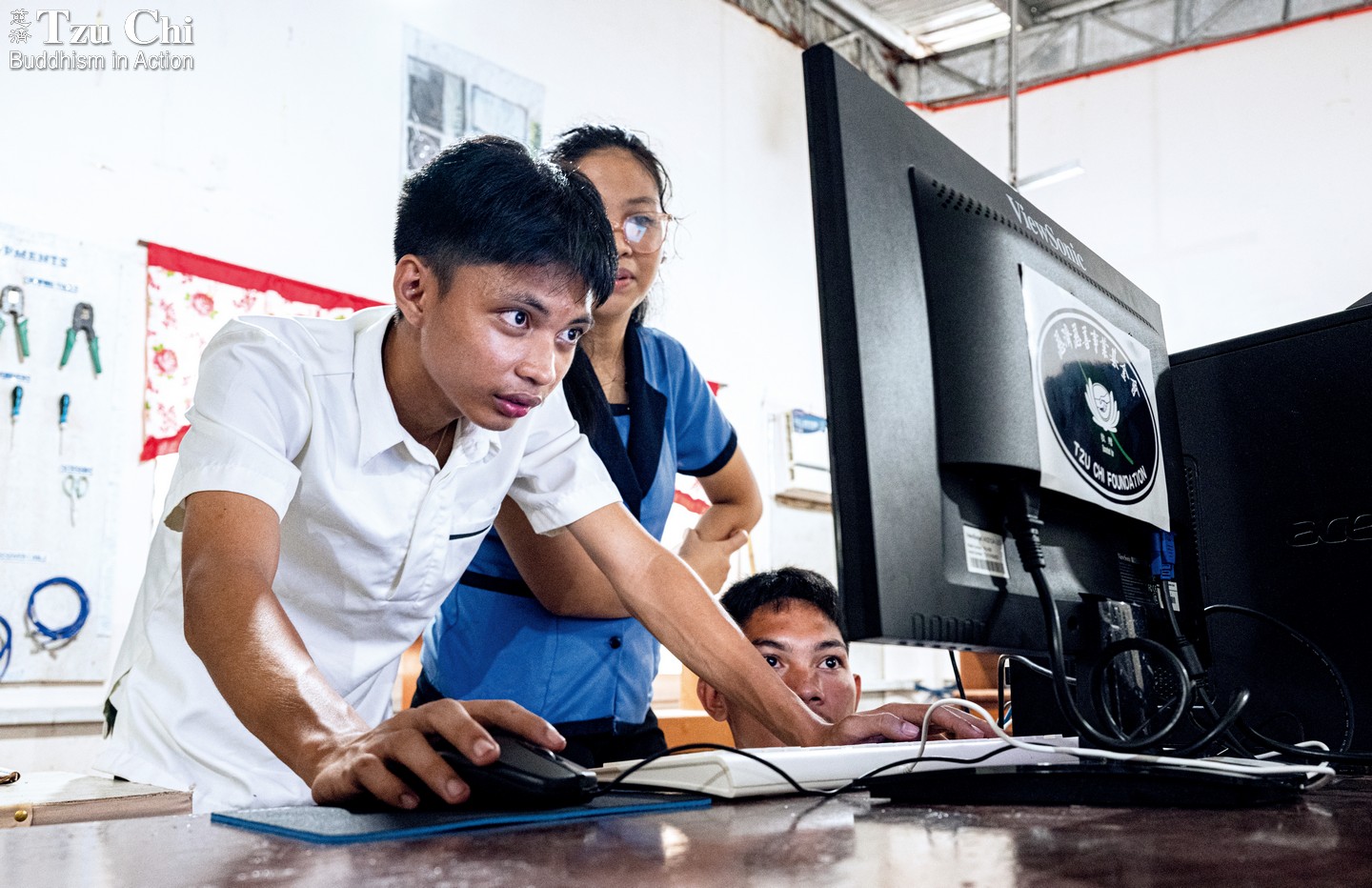
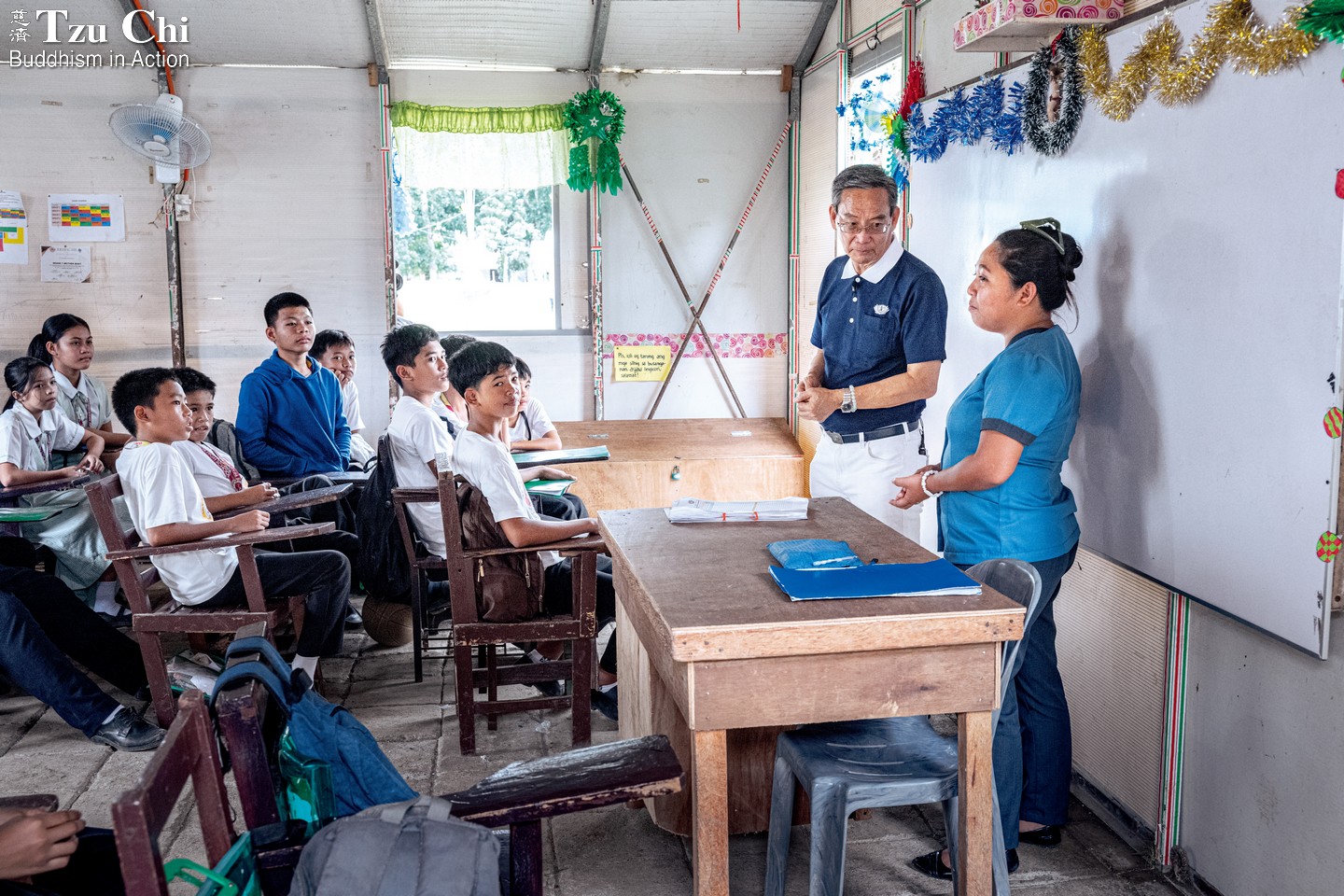
Philippine volunteer James Chua engages with teachers and students to understand their needs.
Scholarships
In 2014, while Tzu Chi was building temporary classrooms in Bohol, volunteers discovered that the earthquake had exacerbated the financial difficulties of many families, forcing their children to discontinue their education. In response, Tzu Chi began offering scholarships to underprivileged students, enabling them to pursue higher education.
Vergie, from earlier in this article, shared her story. Her family lived in a remote mountainous area and survived on farming rice that yielded just enough to feed themselves. As she and her siblings grew older, the burden of tuition fees grew heavier. To support their education, her mother risked venturing into the jungle to collect vines, which she wove into baskets to sell. Fighting back tears, Vergie recalled, “Those were truly difficult days. Tzu Chi’s scholarship program was my only chance to attend university.” Determined to continue her education, she worked hard to gain admission to Bohol Island State University and successfully passed the Tzu Chi scholarship qualification exam, becoming one of its beneficiaries.
Another scholarship recipient, Menard Gabriel Diez Alisoso, shared a similar story. His father had several children to support, including Menard’s older sister, who was already in college. Understanding his family’s financial struggles, Menard was prepared to forgo higher education and had even found a job as a market laborer. But then he unexpectedly learned about Tzu Chi’s scholarship program. After passing the qualification exam, he was able to realize his dream of attending college.
During their university years, Vergie, Menard, and other Tzu Chi scholarship recipients participated in monthly courses to learn about Tzu Chi’s values and philosophy. They also joined volunteers in caring for needy families and visiting orphanages. These experiences led Vergie and Menard to join Tzu Chi Bohol as staff members after graduation.
In June 2024, Vergie secured a position with a government agency. Later that December, she traveled to Taiwan to attend a Tzu Chi year-end blessing and volunteer certification ceremony, becoming the first scholarship recipient from Bohol to be certified as a Tzu Chi volunteer.
Menard, on the other hand, became a key figure in Tzu Chi Bohol’s Happy Home Project. This initiative builds houses for disadvantaged families and elderly individuals living alone, using locally sourced materials like bamboo. Housing recipients can also participate in the construction process, earning wages for their labor. Volunteers continue to support the families with follow-up visits after the houses are finished.
Between 2014 and 2024, Tzu Chi Bohol awarded 2,212 scholarships to young people like Vergie and Menard, with 355 recipients completing their university education. Most of these graduates secured stable jobs, significantly improving their families’ financial circumstances.
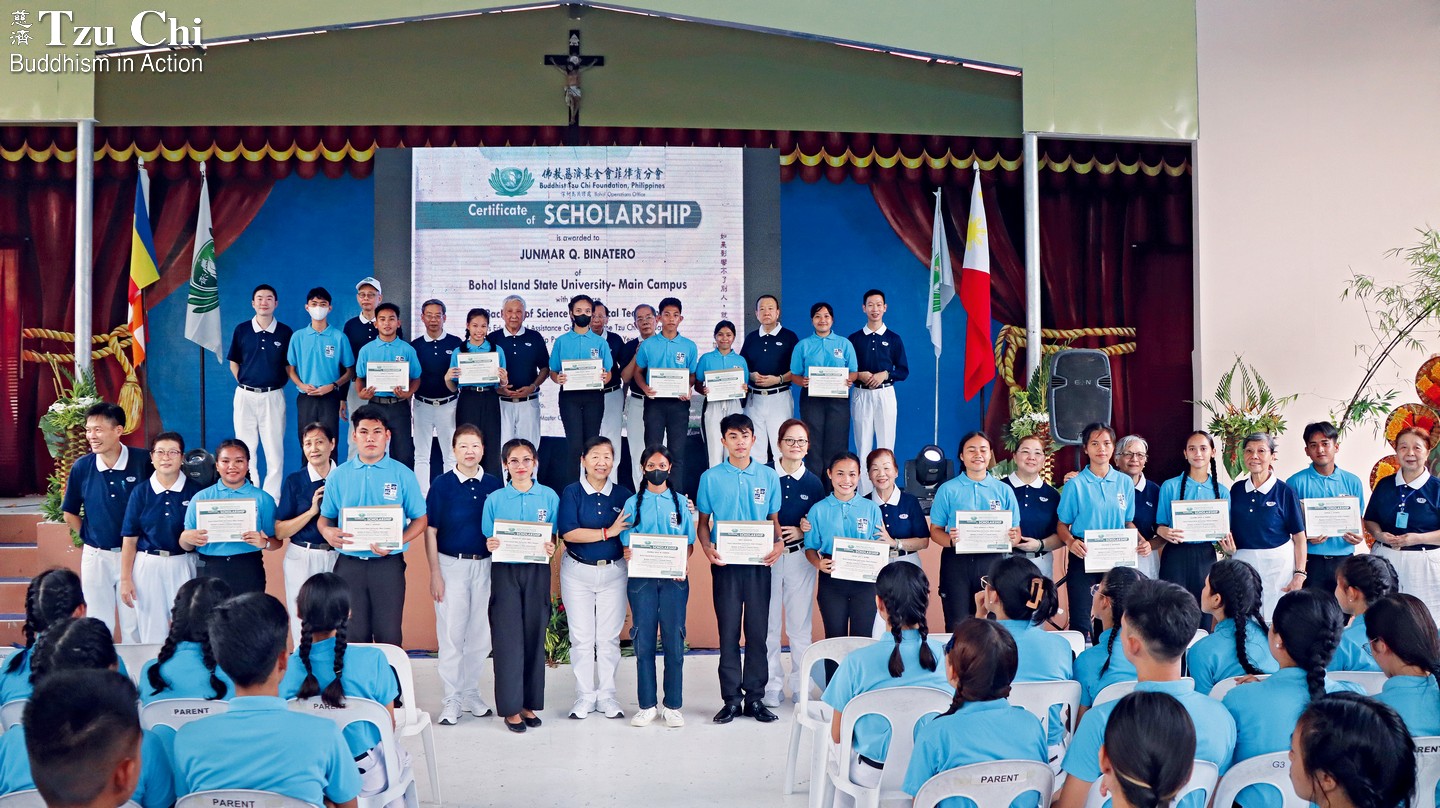
In August 2023, Tzu Chi volunteers hosted a scholarship award ceremony in Loon, Bohol. Du Mei-lin
Vergie P. Almosura, the first Tzu Chi scholarship recipient from Bohol to become a certified Tzu Chi volunteer, completed her college education with the support of the scholarship. After graduating, she secured a stable income, greatly improving her family’s financial situation.
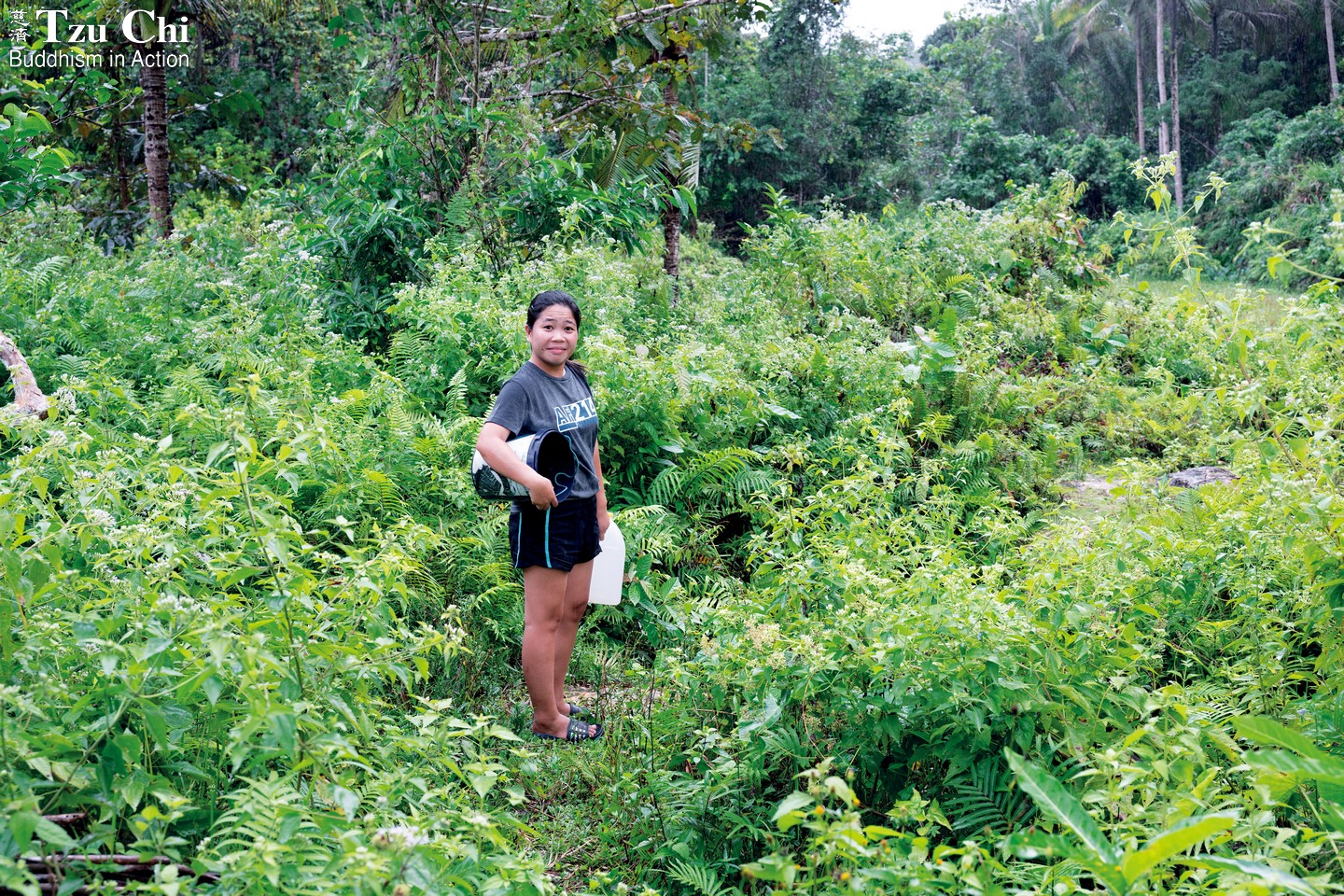
Spreading love
When our team arrived in Bohol on the evening of December 8, we visited Brother Joven Uy at his home. He recounted Tzu Chi’s decade-long journey in Bohol, sharing insights that deeply resonated with us. While many see Bohol as a glamorous tourist destination, he offered a different perspective: “Bohol is a simple and humble place. Most residents are farmers or fishermen, and many families live on the edge of poverty, unable to afford their children’s education. These challenges need more attention.”
He expressed heartfelt gratitude to the Tzu Chi volunteers who had returned to Bohol ten years earlier after providing relief for Typhoon Haiyan. He was especially thankful for Master Cheng Yen’s gentle reminder: “Don’t forget Bohol.” Those words ensured that help reached many people in need.
A decade is just the beginning. Brother Uy and other volunteers in Bohol sincerely hope to inspire more locals to join Tzu Chi’s mission, spreading love and compassion throughout the island.
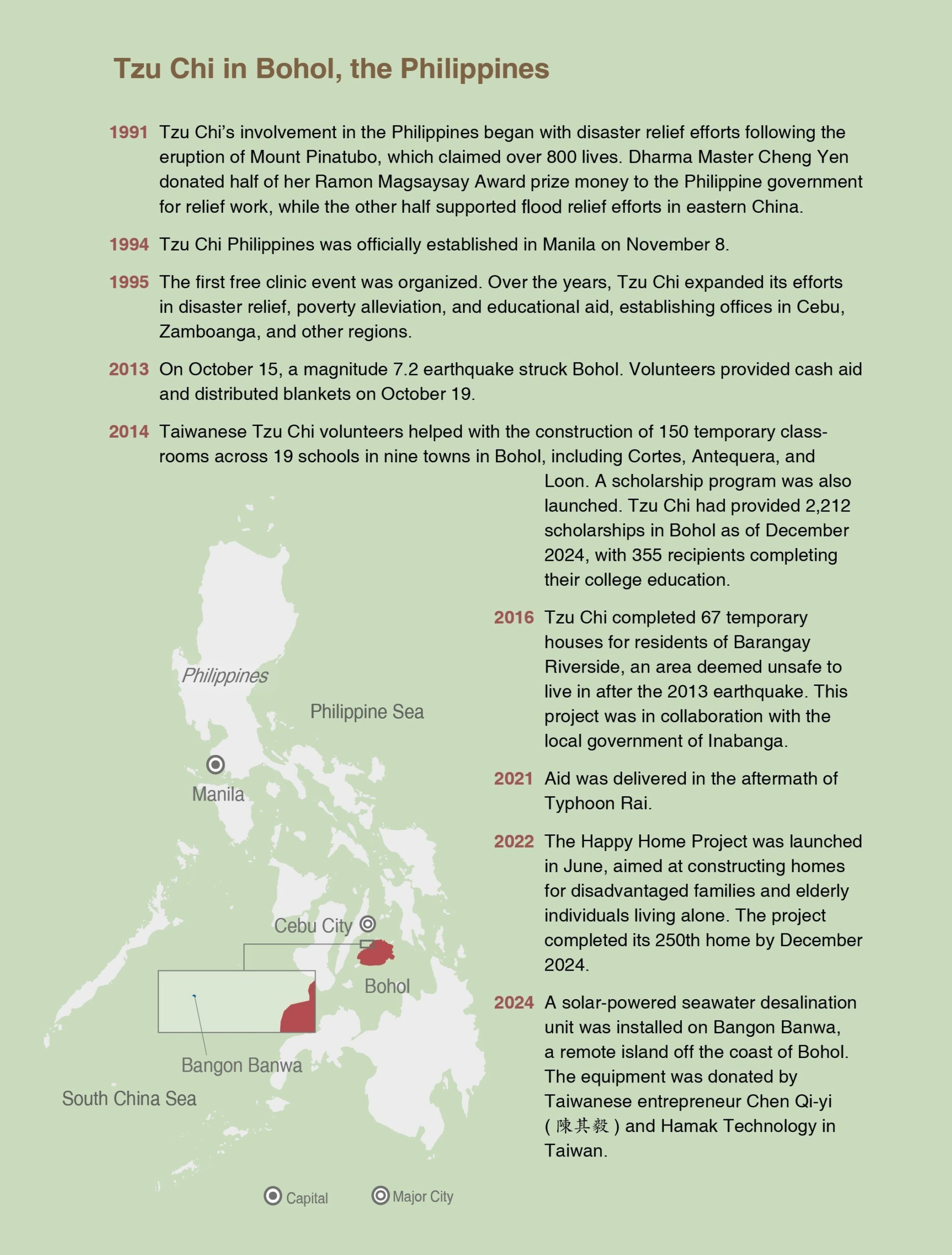
Where Water Is a Luxury
Text and photos by Hsiao Yiu-hwa
Information provided by Jiang Ji-fang
Translated by Wu Hsiao-ting
Photos by Hsiao Yiu-hwa
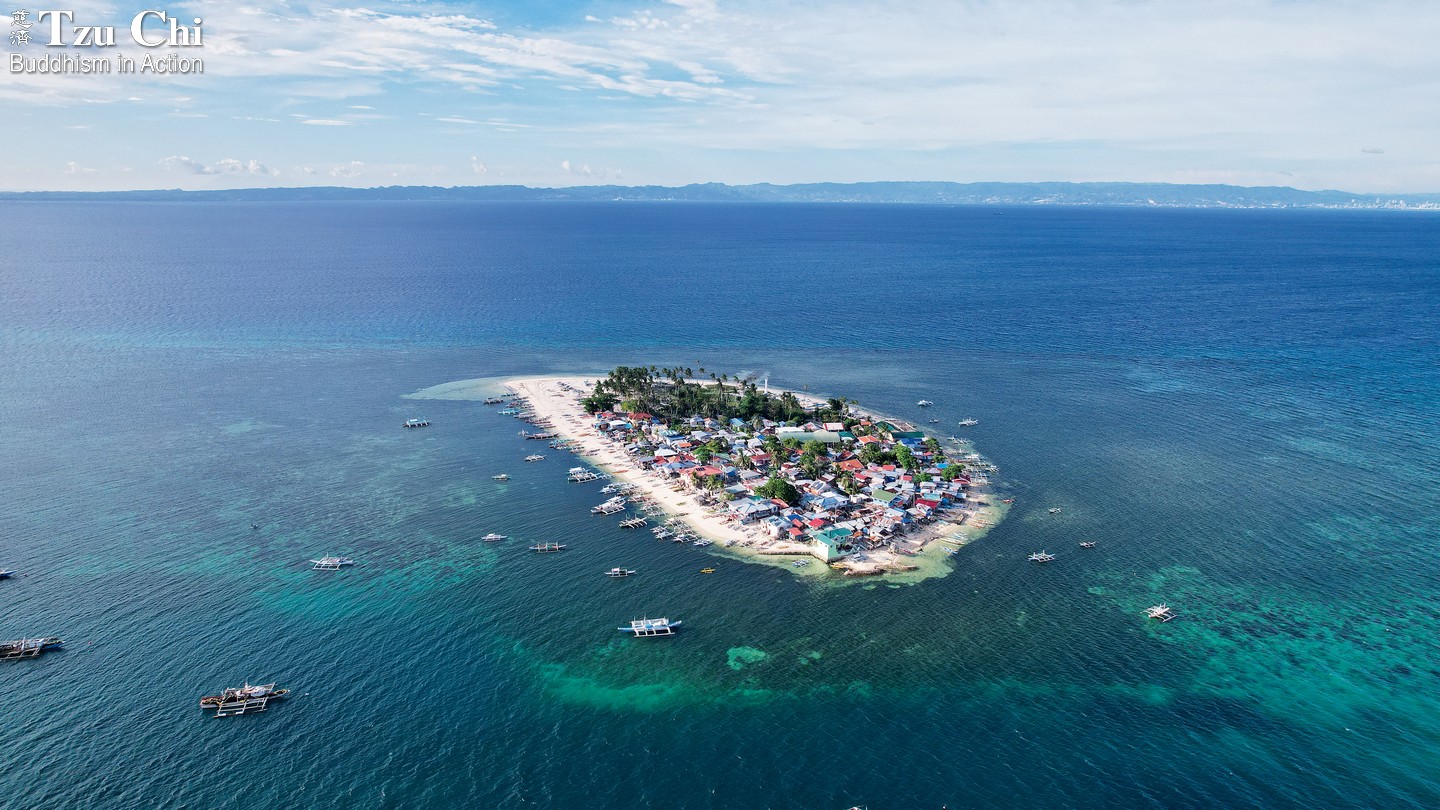
Photo by Chen Yi-ming
Bagong Banwa, an islet located 13 kilometers (8.1 miles) northwest of the main island of Bohol province in the Philippines, spans an area roughly equivalent to three to four soccer fields. Home to over 1,300 residents, the island previously had no freshwater resources and relied almost entirely on the main island for drinking water and essential supplies. Water costs for locals consumed up to ten percent of their monthly income—a struggle also shared by residents of more than 80 small islands surrounding Bohol. Recently, however, conditions have begun to improve with the installation of a solar-powered seawater desalination unit.
Supply Strain
Bagong Banwa, about an hour by boat from Bohol, lacks a formal dock for unloading cargo. All supplies arriving by boat are manually transported. People wade through the water to reach the boat, unload the cargo, and then carry it ashore (photo 1). This labor-intensive process highlights the logistical difficulties of island life, including the high cost of water. In Tubigon, Bohol’s busiest port, a five-gallon container of water costs 40 pesos (US$0.69), but the price rises to 60 pesos (US$1.03) once transported to Bagong Banwa. Photo 2 shows empty water containers placed outside a local home, awaiting transport back to Tubigon for refilling.
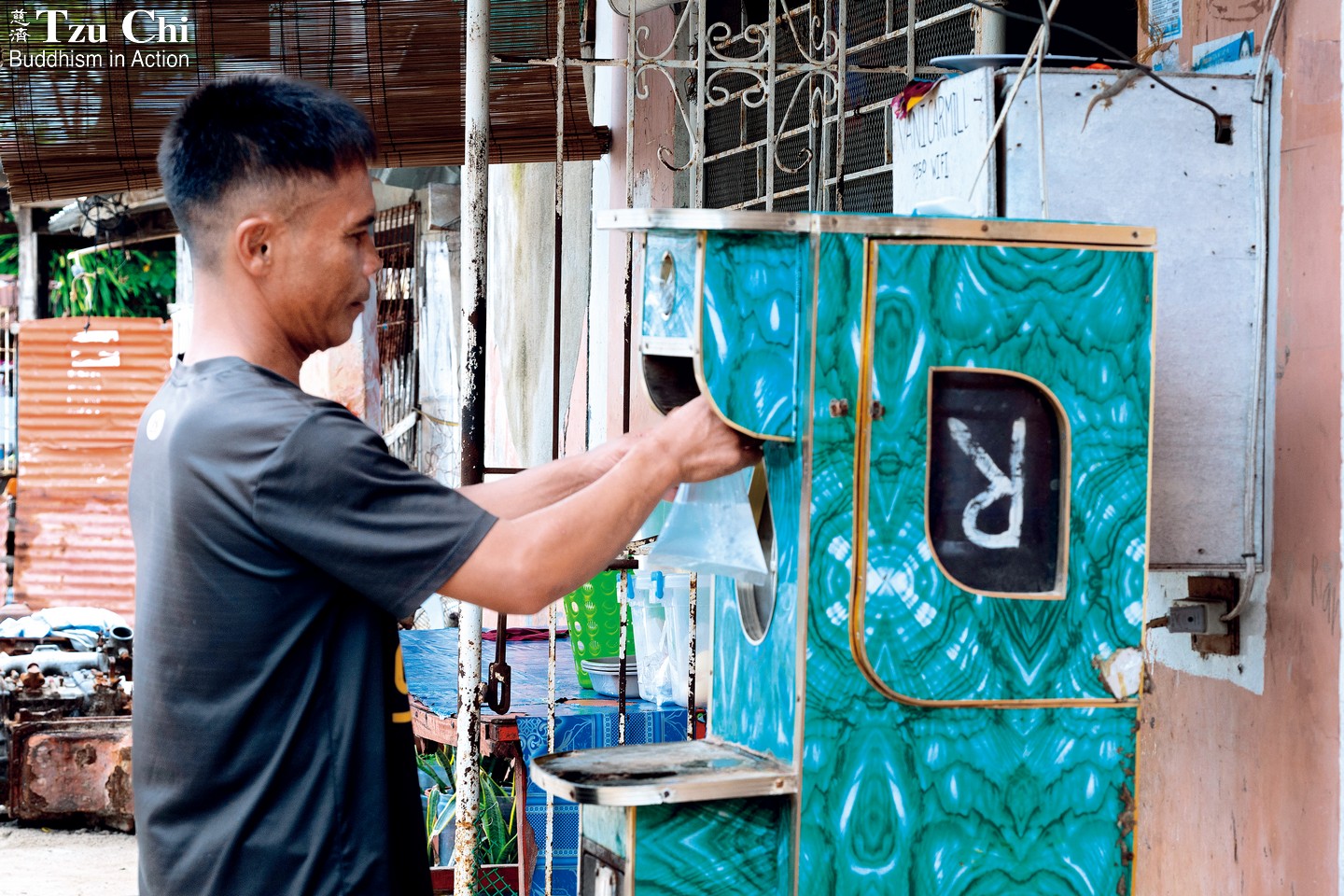
Desalinated Well Water
Bagong Banwa has retail water dispensers, where plastic bags are also provided for collecting water. These dispensers charge one peso for about 250 milliliters of water. Wells are common on the island, producing water with a salinity slightly lower than seawater, primarily used for washing and cleaning. The well water can also serve as a source for desalinated drinking water.
After a year of installation and testing, Tzu Chi Bohol officially launched a solar-powered seawater desalination unit on Bagong Banwa on December 17, 2024. Donated by Taiwanese businessman Chen Qi-yi and Taiwan’s Hamak Technology, the unit uses well water as its source and can produce 5,000 liters of freshwater daily. This is enough to supply drinking water to 2,000 residents of Bagong Banwa and the nearby island of Macaboc, providing each person with a daily allocation of 2.5 liters.
